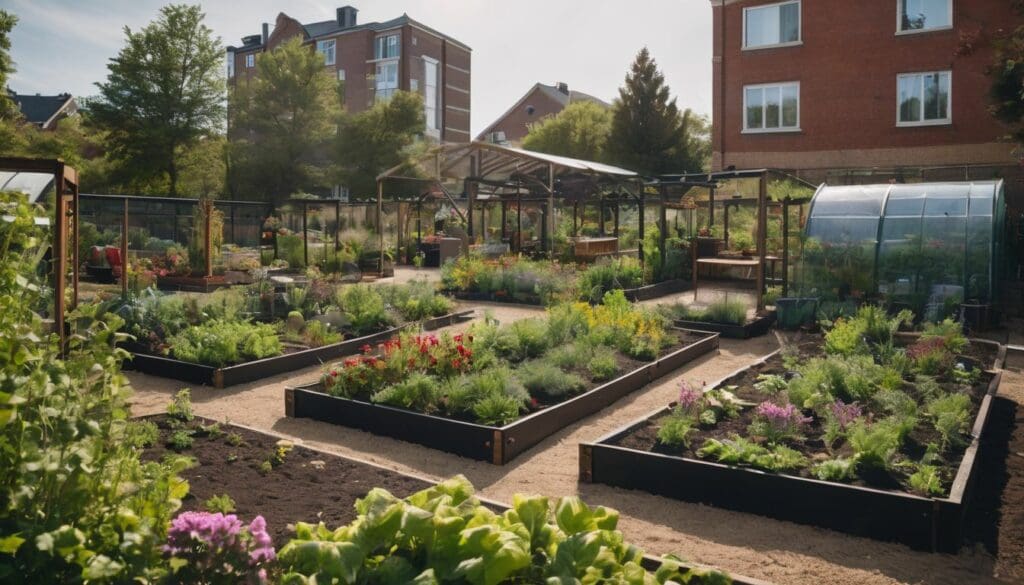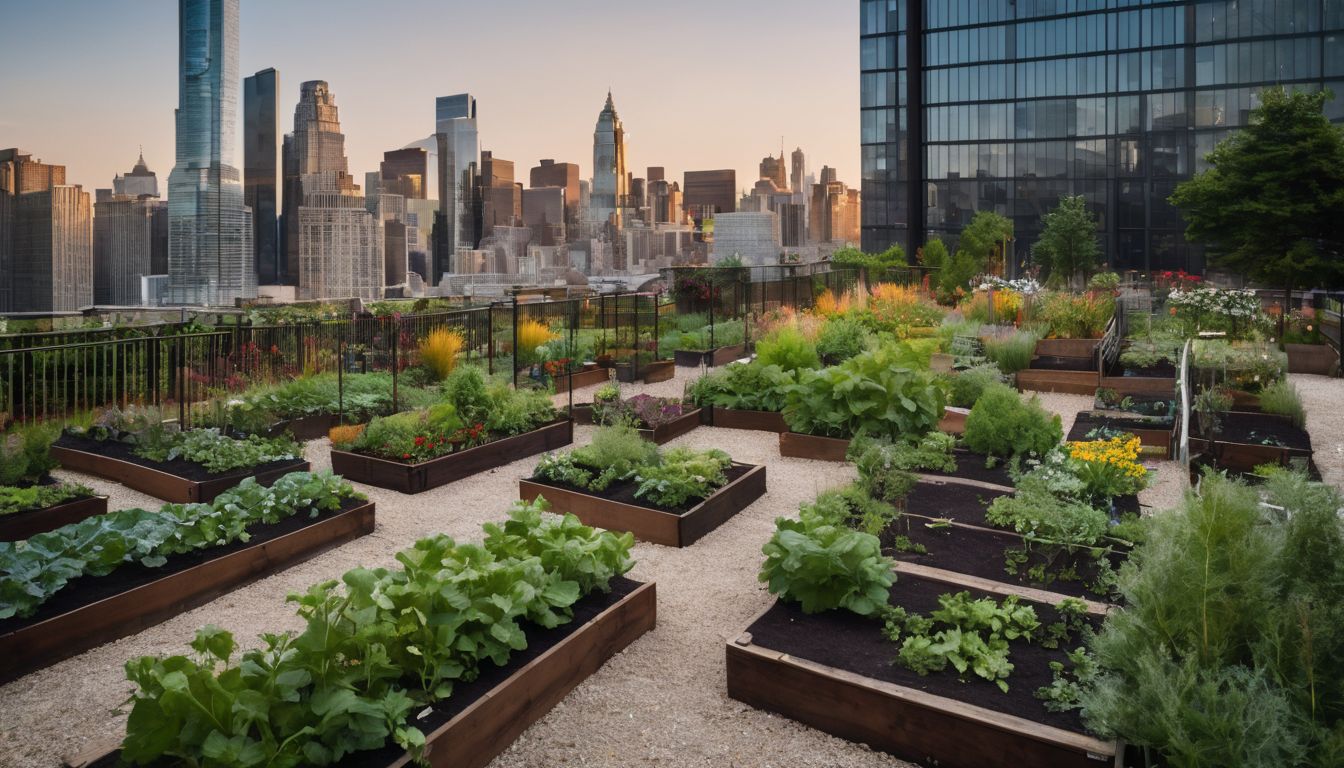Many of us want to live greener, but it’s not always clear how to start. A Sustainable Living Resource Center could be the guiding light for communities seeking an eco-friendly transformation.
This article will unveil the steps needed to create a centre that offers education and resources for sustainable living. Discover how simple changes can make a big impact—read on!
Key Takeaways
- Establishing a Sustainable Living Resource Center involves creating a hub for eco – friendly education, resources, and community involvement. These centres guide individuals on how to live sustainably through workshops, access to sustainable products, and promoting practices such as composting and energy conservation.
- Effective collaboration with local organisations, government agencies, experts, and educators is crucial for setting up a successful resource centre. Partnerships ensure the centre has the necessary support network to provide comprehensive sustainability guidance within the community.
- The resource center’s offerings include green living tips, sustainability training sessions, ecotourism information programmes that encourage responsible travel while supporting conservation efforts. Engaging in these activities helps individuals adopt environmentally conscious choices impacting both their lifestyles and the broader environment.
- Measuring the impact of a Sustainable Living Resource Center is done by assessing community engagement levels in programs offered at the center. Successful case studies demonstrate its influence on improving local sustainable practices and contributing to environmental preservation.
- Future goals aim at expanding the reach of Sustainable Living Resource Centers by developing more extensive educational programs across different communities. This drives forward an agenda focused on fostering widespread adoption of sustainable living principles for long-term ecological benefits.
What is a Sustainable Living Resource Center?
A Sustainable Living Resource Center is a hub that offers tools, resources and information to promote sustainable living, environmental protection, and social equity. It serves as a catalyst for community involvement and empowerment in creating resilient and eco-friendly local initiatives.
Definition and purpose
A Sustainable Living Resource Center serves as a hub for ecofriendly resources and education. Its main aim is to equip people with knowledge and tools needed to lead more sustainable lifestyles.
It stands at the forefront of environmental stewardship, guiding community members toward energy efficiency, conservation of resources, and environmental sustainability. By providing access to information on green living and sustainable resource use, these centers empower individuals and groups to make positive changes in their daily lives.
They play a pivotal role in fostering resilient communities that can withstand environmental challenges. The purpose extends beyond mere information sharing; it’s about sparking action that leads to a healthier, more equitable world.
The center becomes a catalyst for change by offering programs geared towards promoting environmental justice and creating stronger ties among those dedicated to caring for our planet.
Tools and resources offered
A Sustainable Living Resource Center provides valuable tools and resources to help individuals and communities embrace sustainable living practices. Here are a few examples of the tools and resources offered:
- Comprehensive guides on sustainable living practices that cover waste reduction, energy efficiency, and water conservation.
- Access to eco – friendly products and materials for sustainable building and home improvement projects.
- Workshops and training sessions on organic gardening, permaculture, and composting techniques to promote healthy living and sustainable food production.
- Information on renewable energy sources such as solar panels, wind turbines, and energy-efficient appliances to support green living initiatives.
- Resources for sustainable transportation options including electric vehicles, public transit systems, and biking infrastructure to reduce carbon emissions.
Benefits of a Sustainable Living Resource Center
A Sustainable Living Resource Center promotes sustainable living, environmental protection, and social equity. It provides access to information, tools, and resources, while encouraging community involvement and empowerment.
Promotes sustainable living, environmental protection, and social equity
Encouraging sustainable living practices benefits the environment and contributes to social equality. Through providing access to information, tools, and resources, a Sustainable Living Resource Center supports environmentally conscious individuals in embracing green building and sustainable development initiatives within their communities.
The center offers valuable programs such as sustainability workshops, ecotourism information, and green living tips – all aimed at empowering local residents to actively engage in conservation efforts.
By promoting environmental protection and social equity, the Sustainable Living Resource Center serves as a catalyst for positive change within communities while also supporting sustainable resource management.
Provides access to information, tools, and resources
Gain access to a wealth of information, tools, and resources essential for sustainable living. Discover practical tips for green living and manage sustainable resources effectively.
Access workshops, training programmes, and expert advice on environmental conservation and sustainability practices.
Explore ecotourism options that promote responsible travel while minimising the impact on natural environments. Empower yourself with the knowledge needed to make informed decisions, all geared towards establishing and maintaining sustainable communities.
Encourages community involvement and empowerment
Empowerment through knowledge and resources is the bedrock of community involvement. Providing access to sustainable living information, tools, and resources allows individuals to take charge of their environmental impact.
Equipping communities with the know-how and support they need fosters a sense of ownership in sustainability initiatives, leading to active participation in local conservation efforts.
Engagement and empowerment go hand in hand, creating opportunities for individuals to make meaningful contributions towards environmental protection and social equity. By fostering an inclusive environment where everyone’s voice is heard, sustainable living resource centers inspire collective action for positive change.
Creating a Sustainable Living Resource Center
To establish a Sustainable Living Resource Centre, you will need to secure funding resources and collaborate with local organisations and government agencies. It is also crucial to establish partnerships with sustainable living experts and educators.
Identifying and securing funding resources
To establish a Local Sustainable Living Resource Centre, identifying and securing funding resources is crucial. Here are key steps to consider:
- Research and identify potential grants, sponsorships, and funding opportunities from environmental organisations, government agencies, and philanthropic foundations that align with the centre’s mission.
- Create a comprehensive fundraising plan outlining specific financial needs, target donors or investors, and strategies for generating revenue through events, partnerships, and donations.
- Engage in community outreach to raise awareness about the resource centre’s vision and goals, seeking support from local businesses, residents, and environmental enthusiasts.
- Develop a compelling case statement highlighting the importance of sustainable living initiatives and the positive impact of the resource centre on the community.
Collaborating with local organizations and government agencies
To establish a robust Sustainable Living Resource Centre, it is crucial to collaborate effectively with local organisations and government agencies. By partnering with environmental groups, non-profit organisations, and government bodies committed to sustainable living practices, we can leverage collective expertise and resources for the greater good of the community.
This collaboration fosters an inclusive approach to environmental protection and sustainable resource management.
Engaging with local authorities and organisations ensures comprehensive support for a Sustainable Living Resource Centre. Through strategic partnerships, we can access valuable insights into community needs and preferences while fostering a united front in advancing sustainable living practices within the local area.
Establishing partnerships with sustainable living experts and educators
Collaborating with sustainable living experts and educators is crucial for the success of the Sustainable Living Resource Center. These partnerships bring in-depth knowledge and expertise on sustainable practices, which are essential for developing impactful programs and workshops.
By teaming up with these professionals, the resource center can provide visitors with credible information and practical skills to adopt a more sustainable lifestyle.
Engaging experts and educators also enhances the credibility of the center, making it a trusted hub for reliable sustainability guidance in the community. Through these collaborations, individuals can access cutting-edge insights into environmental conservation, waste reduction, energy efficiency, and other key aspects of sustainable living.
Offerings and Programs at a Sustainable Living Resource Center
Learn about the green living tips, sustainability workshops, and ecotourism programs available at a Sustainable Living Resource Center. Find out how you can get involved in promoting sustainable living in your community! Read more to discover the benefits of a local resource center.
Green living tips and resources
- Reduce energy consumption by using energy-efficient appliances and insulating your home.
- Practise water conservation through the use of low-flow fixtures and rainwater harvesting.
- Opt for eco – friendly transportation such as cycling, walking, or carpooling whenever possible.
- Embrace minimalism and reduce waste by reusing, repurposing, and recycling items in your household.
- Source sustainable food options from local farmers’ markets and organic producers.
- Educate yourself on sustainable living practices through books, documentaries, and online resources.
- Engage in community initiatives such as beach clean-ups or tree planting events to contribute to environmental preservation.
Sustainability workshops and trainings
- Intensive hands – on workshops covering topics such as urban gardening, composting, renewable energy, and sustainable architecture.
- Practical training sessions on waste reduction, water conservation, and energy efficiency tailored to everyday living.
- Educational programmes that focus on sustainable food production, ethical sourcing, and healthy eating habits to promote a sustainable lifestyle.
- Workshops led by experts in sustainable practices providing insights into eco-friendly consumer choices and practical ways to reduce environmental impact.
- Training sessions on environmental advocacy, community organising, and effective communication strategies to inspire local action for conservation.
- Accessible online webinars and virtual events enabling wider community participation in sustainability education.
Ecotourism programs and information
Transitioning from sustainability workshops and trainings, a Sustainable Living Resource Center also offers ecotourism programs and information to engage and educate the community.
These programs provide opportunities for individuals to explore sustainable travel options, learn about eco-friendly destinations, and participate in responsible tourism practices.
Visitors can access resources on conservation-focused vacations, low-impact travel tips, and ethical wildlife experiences. The center aims to inspire individuals to make environmentally conscious choices when planning their travels, ultimately contributing to the preservation of natural habitats and cultural heritage.
Additionally, the ecotourism offerings may include guided tours led by local experts highlighting sustainable initiatives in the region. Through these activities, participants gain valuable insights into environmental stewardship while supporting local economies.
Impact and Success of a Sustainable Living Resource Center
The impact and success of a Sustainable Living Resource Center can be measured through community engagement, successful programs and initiatives, and future goals for expansion. Case studies will highlight the positive influence on sustainability practices within the local area.
Measuring community engagement and involvement
Measuring community engagement and involvement is a vital aspect of assessing the impact of a Sustainable Living Resource Center. Surveys, focus groups, and participation rates in center activities are key indicators used to gauge the level of community involvement.
Additionally, tracking changes in local sustainable practices and environmental awareness provides valuable insights into the effectiveness of the center’s outreach efforts.
Effective measurement tools allow resource centers to continuously adapt their programs to better meet community needs. They can also demonstrate the positive influence on sustainable living habits within the locality and beyond.
Case studies of successful programs and initiatives
After measuring community engagement and involvement, it is essential to highlight the impact of successful programs and initiatives. Demonstrating tangible examples of how sustainable living resource centers have positively influenced communities can inspire and motivate others to get involved. Here are some in-depth case studies that illustrate the success of implementing sustainable living programs:
- Implementing a community garden initiative resulted in increased access to fresh produce, reduced food miles, and enhanced social connections among residents.
- Introducing a recycling program within a local school significantly reduced waste sent to landfills and educated students about the importance of responsible waste management.
- Hosting regular sustainability workshops led to a reduction in household energy consumption and an increase in awareness about environmental conservation practices within the community.
- Collaborating with local businesses to adopt eco – friendly practices led to significant reductions in carbon emissions and waste production, while also improving their overall corporate social responsibility.
- Establishing an ecotourism program attracted visitors from outside the area, boosting the local economy while promoting sustainable travel practices and appreciation for natural environments.
- Providing resources for composting and organic gardening led to improved soil quality, reduced chemical usage, and increased biodiversity within neighbourhoods.
- Creating partnerships with local authorities to implement policies for renewable energy adoption resulted in decreased reliance on fossil fuels and a more resilient energy infrastructure for the community.
Future goals and expansion plans for the resource center
The resource center plans to expand its offerings by introducing more in-depth sustainability workshops and trainings. A key focus is on developing ecotourism programs that highlight environmentally-friendly travel practices and destinations.
The goal is to increase community involvement, engagement, and empowerment through educational initiatives. Additionally, the resource center aims to partner with more sustainable living experts and educators to diversify the knowledge available to visitors.
Furthermore, the long-term vision includes establishing satellite locations in neighbouring communities for easier access to resources and information. This expansion plan aligns with the centre’s mission of promoting sustainable living, environmental protection, and social equity within a wider reach across different regions.
Conclusion
In conclusion, establishing a local sustainable living resource centre empowers communities and promotes environmental protection. It provides access to valuable information and resources for those interested in sustainable living.
Collaborating with local organisations and experts ensures the success of such initiatives. Empowering individuals to make eco-friendly choices contributes to building a more sustainable future for everyone.
FAQs
1. What is a Sustainable Living Resource Center?
A Sustainable Living Resource Center is a community hub that provides information and tools to help people manage resources sustainably and live eco-friendly lives.
2. How does a Sustainable Living Resource Center benefit the local area?
Such centers empower locals with knowledge on how to reduce environmental footprints, support sustainable practices at home, and encourage resource management within the community.
3. Can anyone start a Sustainable Living Resource Center?
Yes, any motivated individual or group can establish this type of center by gathering support from their community and securing resources for sustainability education and initiatives.
4. What activities might take place at a Sustainable Living Resource Center?
Activities could include workshops on recycling, composting classes, sharing ideas for energy conservation, or demonstrating water-saving techniques – all aimed at promoting sustainable living habits.





